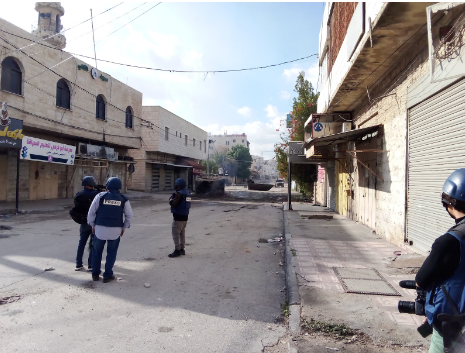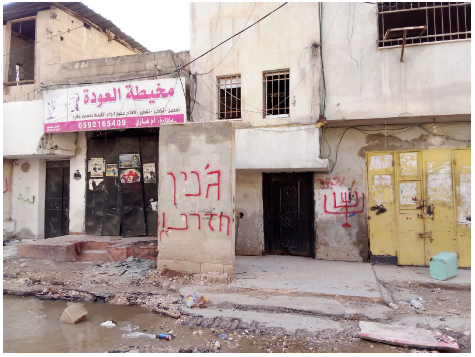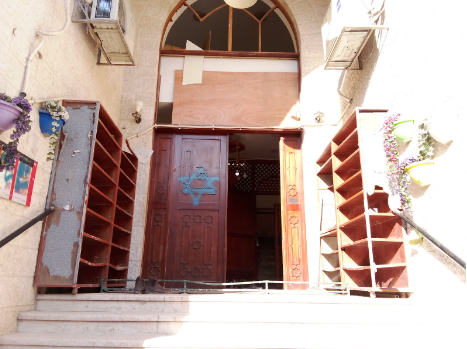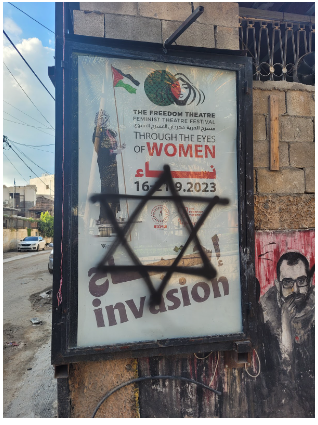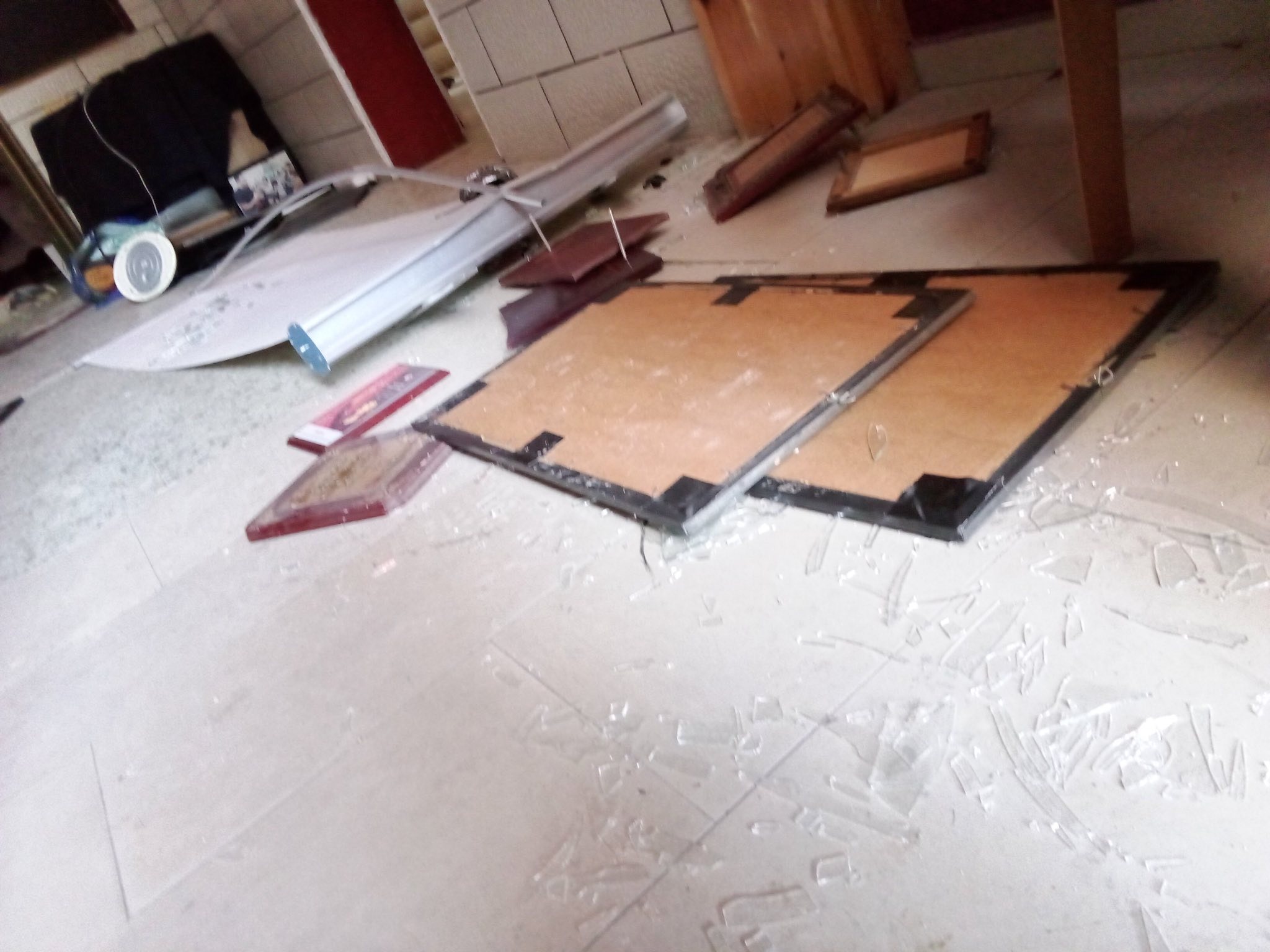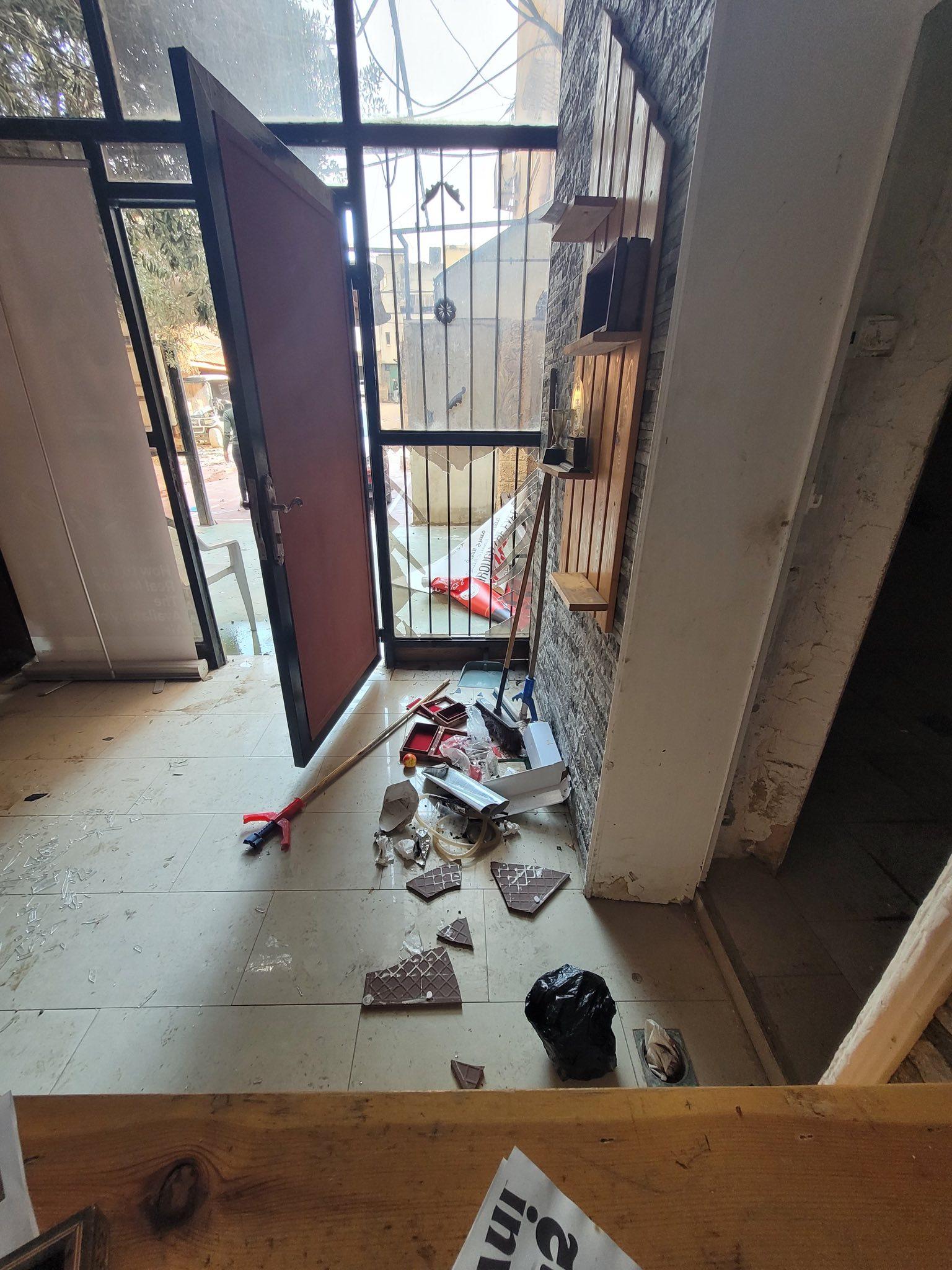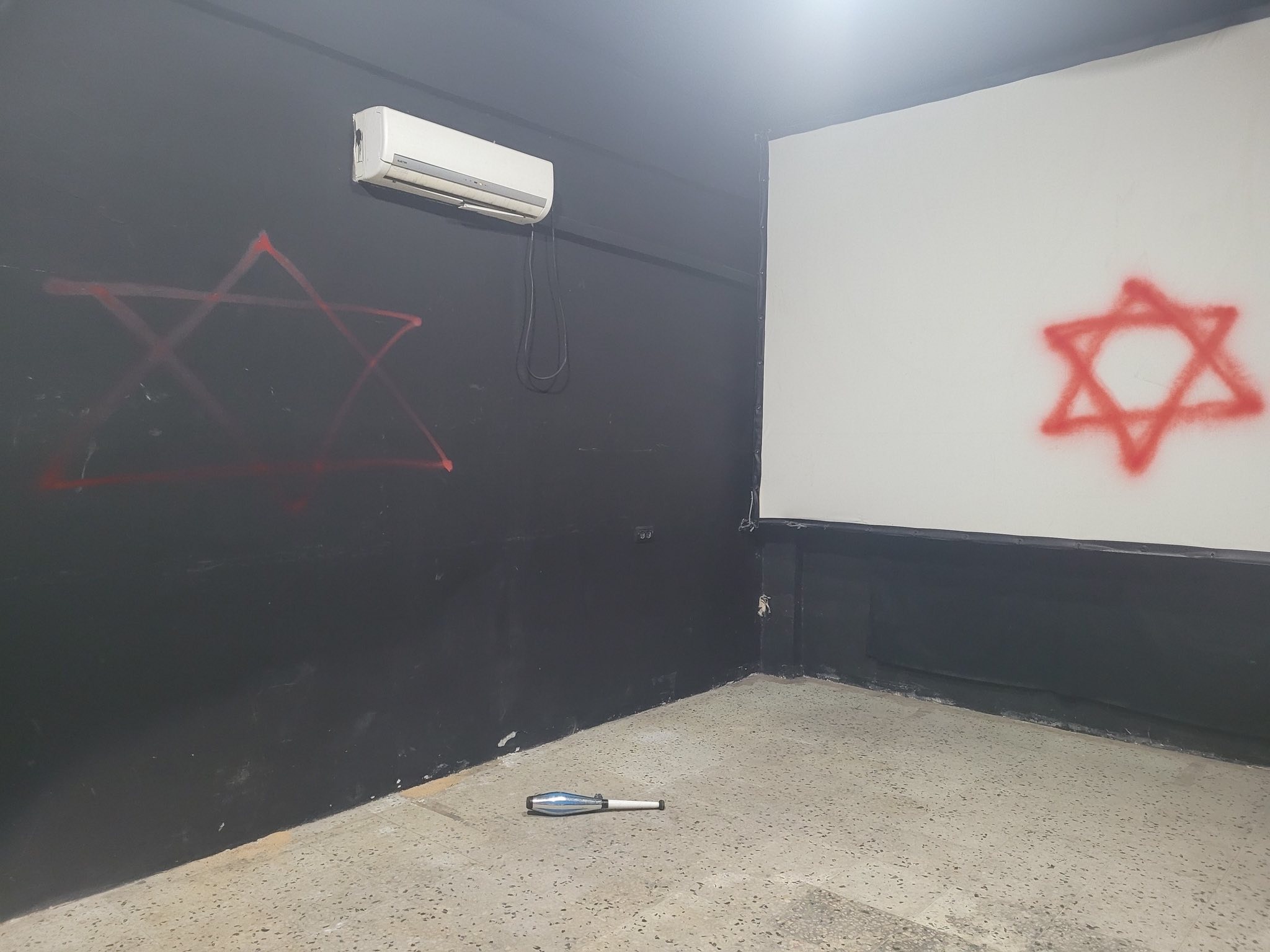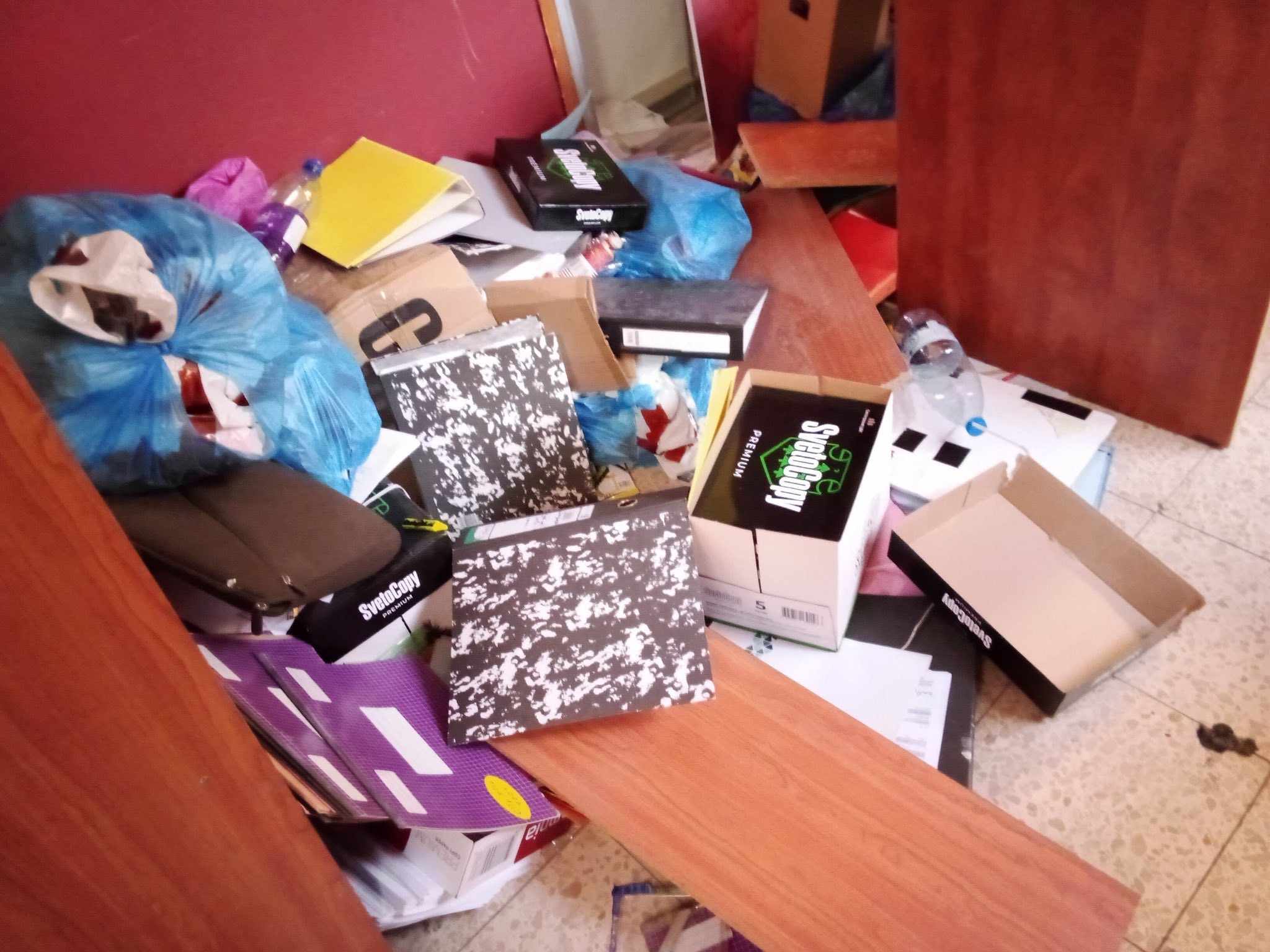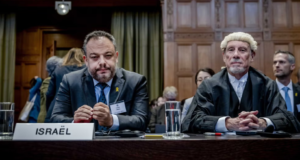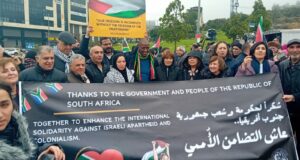17 December 2023 | International Solidarity Movement | Jenin
On Wednesday, December 13, I received a message from a fellow actress of the Freedom Theatre informing me that the occupation forces had arrested without charge Mustafa Sheta, theatre director and general manager, Ahmed Tobasi, artistic director, as well as Jamal Abu Joas, acting coach. The arrests took place in a military raid carried out by the occupation forces in the city of Jenin, with their main target being the refugee camp where the headquarters of the Freedom Theatre is located.
Mustafa Sheta was arrested at his home in the city of Jenin, where they handcuffed him and took him, mercilessly, in front of his children. They sat the whole family in the living room and when they identified Mustafa they asked him, “Have you done anything?” To which Mustafa replied, “I have not done anything.” Still, the occupation forces took him away and to this day nothing is known about him.
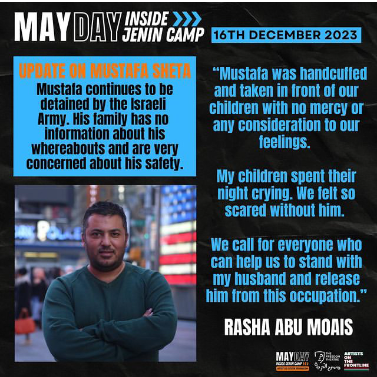
Mustafa Sheta, Freedom Theater Director, arrested and still imprisoned by IOF. Credit: The Freedom Theatre
On the night of December 12, 2023, Tobasi heard soldiers knocking on neighbors’ doors. He got dressed, put on a winter jacket and got ready because he was worried about them coming to his home.
The next morning, shortly after 9 a.m., the Israelis began attacking and looting the Freedom Theatre. They fired from inside the theatre, destroying the offices and knocking down a wall. Tobasi’s house is directly across from the Freedom Theatre.
Around 11:30 a.m., still fully dressed and still hearing disturbances, he came out and said, “Why are you making all this noise? You are terrorizing children.”
The Israeli army took Tobasi and beat him. They made him take off his jacket and threw him on the ground in the street, in the cold and rain.
Shouting at Tobasi that he should stay there, the army entered his house and broke everything. They smashed his computer screen, his iPad, and destroyed everything they could, even taking the plants and throwing them on the ground.
After breaking everything in the house, the Israeli army took a towel from the house and blindfolded Tobasi. They then went to look for Mohammed, Tobasi’s brother.
Occupation forces handcuffed them both and took them away. They did not have enough clothing for the cold and winter weather.
Jamal Abu Joas has also been captured by the Israeli army.
Jamal recently graduated from the Freedom Theatre School of Performing Arts, where he is now an acting coach and also a freelance photographer.
The army invaded his house, and searched and took everything, including Jamal’s phone and camera. The soldiers have beaten him brutally.
On Thursday afternoon we decided to go to the city of Jenin in support and solidarity for my colleagues and friends from the Freedom Theatre and to document what had happened.
We arrived around two in the afternoon in the city of Jenin, and all the shops were closed. Some boys helped us get closer to the entrance of the refugee camp. Between the sounds of detonations of live ammunition and the smell of teargas we advanced, but only halfway. On the way we had to stop, there was an ambulance and a barricade that blocked the way.
Further up, at the entrance to the refugee camp, there was a convoy of the Israeli army. Journalists were gathered on the edge of the street at the entrance of a hospital and residential house. We waited for about 10 minutes; the sound of the live fire grew louder. But then the occupation forces withdrew and we were able to enter.
We entered through a side street towards the central square of the camp. From the first moment we could see the level of destruction that had been undertaken. The streets were completely destroyed, the doors of the houses broken, the shops destroyed, the water was running all over the place. What were once streets were now muddy fields because the army had also broken the pipes to destroy the water infrastructure. The level of destruction was incalculable.
We arrived at the central square which was unrecognizable. Wherever one turned there was graffiti of the Star of David painted on walls.
All the surroundings were damaged. We joined with local community members trying to clean a little and see how they could repair what the occupation forces had destroyed. We continued walking towards the theatre. My eyes could not recognize where I was. This place that I walked so many times could not be connected with my memories. The firefighters were putting out a fire in a house that still seemed to be burning We could feel the heat coming off as we passed by.
When we arrived outside the theatre, I couldn’t believe what I was seeing. The place that I saw so full of life the last time I was there was covered by a spectral silence. The warehouse, the theatre room, the offices, everything had been destroyed. They threw everything everywhere. They broke everything: books, pictures, doors, computers, screens, glass. And again, the Star of David was everywhere one looked. They did this as an exercise in intimidation, cruelty and power. This was not only an attack on life but also an attack on freedom. The occupation forces want to end any type of resistance.
I went out to the parking lot again and see a man outside the theatre room. When he turns to me, it takes me a moment to recognize him. He is Tobasi. They have released him. I hug him tightly. I feel relieved to see him again. He asks me how I am. “Confused,” I respond, “I think it’s absurd for me to ask you.” But he nevertheless responded, “Alhamdulillah.”
It is evident that they have hurt him, that they tortured him, that they beat him. It is difficult for him to walk. We entered the office at a slow but steady pace. “They destroyed everything,” he says. When we are in one of the offices outside we hear the noise of a car engine, he turns around and asks me, “Is it a jeep?” No, it’s just a car, but we have to leave. We offer to help clean, but he says, “Later, now it’s not safe. They can come back at any time.
Already on the street outside the theatre, we say goodbye. I told him to write to me, that I will return. He said, “Yes, but in a couple of days, now it is not safe.” I told him that I am here for him, for Mustafa and for the Freedom Theatre. I initially came to do an artistic residency with them, which was cut short by the events that arose after October 7. “Take care of yourself, be careful, stay safe,” he said.
We continued walking deeper into the camp, reaffirming with our eyes the horror and devastation.
We reached the roundabout where the great monument of the map of Palestine was located, which was knocked down. We advanced a little further and the children around us run and shout at us “Jeish Jeish,” the occupation forces had returned. Explosions were heard and the sound of the siren announcing a new incursion. We didn’t have much time to stop and think of what to do, to either take refuge in the theatre or continue to try to reach the service station to Ramallah. We decided to continue. A Palestinian in a car offered us a ride to the service station; walking wasn’t safe. We tried to insist on giving him money but he more insistently refused. At the service station we said goodbye.
The service advanced towards Ramallah, leaving behind the unprecedented devastation. My memories want to find a place in this reality. It is like trying to put together a puzzle from which several pieces have been stolen.
The next morning Tobasi gives an interview in which he says the attack on the refugee camp has been the most devastating, the most violent since 2002, referring to the second intifada. Jenin is now in some ways the other Gaza.
 International Solidarity Movement Nonviolence. Justice. Freedom.
International Solidarity Movement Nonviolence. Justice. Freedom.
